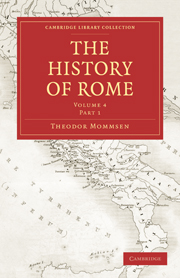Book contents
- Frontmatter
- PREFATORY NOTE
- Contents
- BOOK FIFTH THE ESTABLISHMENT OF THE MILITARY MONARCHY
- CHAPTER I MARCUS LEPIDUS AND QUINTUS SERTORIUS
- CHAPTER II RULE OF THE SULLAN RESTORATION
- CHAPTER III THE FALL OF THE OLIGARCHY AND THE RULE OF POMPEIUS
- CHAPTER IV POMPEIUS AND THE EAST
- CHAPTER V THE STRUGGLE OF PARTIES DURING THE ABSENCE OF POMPEIUS
- CHAPTER VI RETIREMENT OF POMPEIUS AND COALITION OF THE PRETENDERS
CHAPTER IV - POMPEIUS AND THE EAST
Published online by Cambridge University Press: 10 November 2010
- Frontmatter
- PREFATORY NOTE
- Contents
- BOOK FIFTH THE ESTABLISHMENT OF THE MILITARY MONARCHY
- CHAPTER I MARCUS LEPIDUS AND QUINTUS SERTORIUS
- CHAPTER II RULE OF THE SULLAN RESTORATION
- CHAPTER III THE FALL OF THE OLIGARCHY AND THE RULE OF POMPEIUS
- CHAPTER IV POMPEIUS AND THE EAST
- CHAPTER V THE STRUGGLE OF PARTIES DURING THE ABSENCE OF POMPEIUS
- CHAPTER VI RETIREMENT OF POMPEIUS AND COALITION OF THE PRETENDERS
Summary
We have already seen how wretched was the state of the affairs of Rome by land and sea in the East, when at the commencement of 687 Pompeius with an almost absolute plenitude of power undertook the conduct of the war against the pirates. He began by dividing the immense field committed to him into thirteen districts and assigning to each of these districts a lieutenant, for the purpose of equipping ships and men there, of searching the coasts, and of capturing piratical vessels or chasing them into the meshes of a colleague. He himself went with the best part of the ships of war that were available—among which on this occasion also those of Rhodes were distinguished—early in the year to sea, and swept in the first place the Sicilian, African, and Sardinian waters, with a view especially to reestablish the supply of grain from these provinces to Italy. His lieutenants meanwhile addressed themselves to the clearing of the Spanish and Gallic coasts. It was on this occasion that the consul Piso attempted from Rome to prevent the levies which Marcus Pomponius the legate of Pompeius instituted by virtue of the Grabinian law in the province of Narbo—an imprudent proceeding, to check which, and at the same time to keep the just indignation of the multitude against the consul within legal bounds, Pompeius temporarily reappeared in Rome (P. 108).
- Type
- Chapter
- Information
- The History of Rome , pp. 113 - 154Publisher: Cambridge University PressPrint publication year: 2010First published in: 1866

